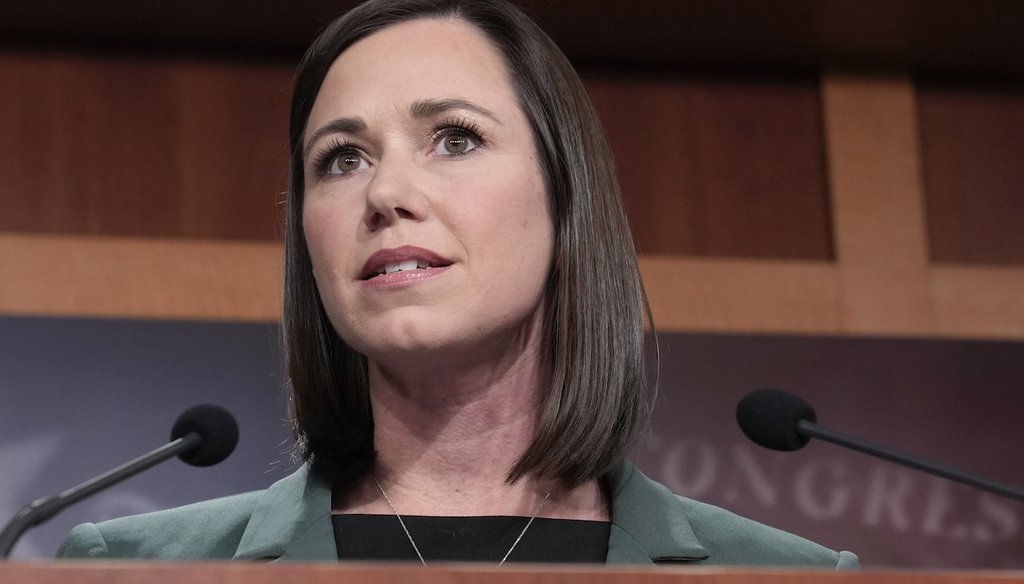Stand up for the facts!
Our only agenda is to publish the truth so you can be an informed participant in democracy.
We need your help.
I would like to contribute

Sen. Katie Britt, R-Ala., speaks during a news conference on the border, Feb. 15, 2023, on Capitol Hill in Washington. (AP)
Would Sen. Katie Britt’s bill ‘create a national registry of pregnant women’? No.
If Your Time is short
-
Sen. Katie Britt, R-Ala., introduced a bill that would create pregnancy.gov, a federal website with resources for pregnant women and mothers. The resources would exclude information from organizations that provide abortions.
-
The bill doesn’t mention the words "registry" or "database." It says that if website users choose to take an "assessment" available through the website, they can consent to share their contact information "which the (Department of Health and Human Services) Secretary may use to conduct outreach via phone or email to follow up with users on additional resources."
-
The bill doesn’t explain how this collected data would be handled or who would have access to it. Critics said that vagueness poses concerns for pregnant women’s privacy.
Sen. Katie Britt, R-Ala., recently introduced a bill that would establish a federal website with resources for pregnant women and mothers. But critics are raising alarm over the legislation, which they say has dangerous implications for women.
Democrats and other blue check users on X said Britt’s bill would "create a national registry" or "federal database" of pregnant women. Some news outlets, including The Guardian, Salon and Raw Story, ran headlines that made similar claims about the bill.
"So (Britt) creates a database of pregnant women so Trump then knows who to prosecute if any of those women get an abortion," Democratic National Committee Chair Jaime Harrison said on X.
Kentucky Democrat Amy McGrath, who unsuccessfully ran to unseat Sen. Mitch McConnell, R-Ky., in 2020, said on X, "According to the GOP, America needs a national registry for pregnant women."
The bill text doesn’t mention the words "registry" or "database." Britt’s spokesperson, Sean Ross, told PolitiFact that "these social media posts are intentionally, flagrantly false."
The measure says that if website users consent to provide their contact information, the U.S. Department of Health and Human Services may call or email them to share additional resources. The bill neither defines other ways users’ contact information might be used, nor says who would, or would not, have access to the data beyond the department’s secretary.
Critics say the bill’s ambiguity poses data privacy concerns for the site’s users. The bill has also been criticized for excluding from the website’s resource list any information from organizations that offer abortions.
The bill, titled the More Opportunities for Moms to Succeed (MOMS) Act, says it would establish the government website pregnancy.gov as "a clearinghouse of relevant resources available for pregnant and postpartum women, and women parenting young children."
The bill says the website would include "a series of questions" users could answer to generate a list of "relevant resources" within a ZIP code. The website would show online resources and organizations that provide services within 100 miles of that ZIP code.
The website’s resources would include public and private entities that provide mentorship opportunities; health and well-being services; financial assistance; material or legal support; mental health services; child care, adoption or foster care services; and information on abortion risks or alternatives to abortion, according to the bill.
The bill says pregnancy.gov would also contain an "assessment" through which users could "provide consent to use the user’s contact information, which the (Department of Health and Human Services) Secretary may use to conduct outreach via phone or email to follow up with users on additional resources that would be helpful for the users to review."
The bill prohibits information from organizations, including any affiliates, subsidiaries, successors and clinics, that "perform, induce, refer for, or counsel in favor of abortions, or provide financial support to any other organization that conducts such activities."
People using pregnancy.gov would not be required to disclose personally identifiable information, Ross said, nor does the bill say that the website would ask users about their pregnancy status. Although the bill does not specifically address this, Ross said no login or registration would be required to use the site.
Ross said the "assessment" would ask users about the website’s accessibility and helpfulness, and enable them to opt in with a phone number or email address; the Department of Health and Human Services may then contact these users with additional resources. Ross said Britt envisions this outreach to be a one-time occurrence.
Receiving this outreach is voluntary, Ross said, and people could use a "burner" email address or pseudonym to remain anonymous. The additional resources provided would vary by person and be largely up to the department’s discretion, he said, although they would exclude entities that provide abortions.
Featured Fact-check
Another bill provision would provide grants to nonprofit organizations that "support, encourage and assist women to carry their pregnancies to term and to care for themselves and their babies after birth." Entities providing abortions would be excluded from these grants.
Because Democrats have a slim majority in the Senate, Britt’s bill is unlikely to pass if it is brought to a vote.
We contacted the Department of Health and Human Services with questions about the potential impact of the legislation but did not hear back.
Dr. Rob Davidson, a west Michigan-based emergency physician, shared in a series of X posts his concerns about Britt’s bill, including that it would "create a database of pregnant women in the U.S." Davidson is also the executive director of the Committee to Protect Health Care, a national organization advocating for expanding health care access, lowering medical costs and protecting reproductive rights.
Although Davidson acknowledged users would have to voluntarily provide contact information and consent to receive outreach on the proposed website, he told PolitiFact that many people don’t read the fine print to know what that information sharing entails.
Davidson said it’s "very concerning to me" that this bill would have "women who are pregnant, who are considering their options, hand over their information and just the fact that they are pregnant to a government database. Where does that information go?"
Shannon Watts, founder of the gun violence prevention advocacy group Moms Demand Action, also criticized the bill on social media, saying it would "create a federal database of pregnant women."
"The website would create a ‘database’ of user contact information that could be used for ‘outreach via phone or email,’" Watts told PolitiFact. "The public has no guarantee (or reason to trust) how that information would actually be used."
The bill doesn’t have provisions about the dissemination or destruction of the data the website collects, said Mary Ziegler, an abortion historian and law professor at the University of California, Davis.
"So, I think it’s fair for people reading the bill to ask questions and be concerned about how the information would be used," Ziegler said.
Because of the limitations on what kind of resources the website would offer, critics said people seeking information would be directed only to crisis pregnancy centers, or facilities that dissuade or prevent people from seeking abortions.
"The law doesn’t require the creation of a registry at all. It’s not mandatorily requiring anyone to give information or interact with the website at all," Ziegler said. "So, in that sense, it doesn’t create a registry or mandate compliance with a registry, but it’s certainly setting up the information people will receive and the information that people will use in a way that’s designed to help the antiabortion movement."
Social media users claimed Britt introduced a bill "to create a national registry of pregnant women."
The bill would create pregnancy.gov, a website designed as a clearinghouse of information and resources for pregnant women. It would bar information from organizations that provide abortions.
The legislation does not mention the words "registry" or "database." It says that if website users choose to take an "assessment" available through the website, they can consent to share their contact information and may receive additional resources from the Department of Health and Human Services. Britt’s spokesperson said the bill would not require a login or registration to access, although the bill doesn’t specify this.
Critics counter that the bill is vague about how collected data would be handled or who would have access to it.
But to describe this as a "national registry" of pregnant women is inaccurate. We rate that claim False.
Our Sources
Phone interviews and email exchanges with Sean Ross, spokesperson for Sen. Katie Britt, R-Ala., May 13, 2024
Phone interview with Mary Ziegler, an abortion historian and law professor at the University of California, Davis, May 13, 2024
Phone interview with Dr. Rob Davidson, a west Michigan-based emergency physician and executive director of the Committee to Protect Health Care, May 14, 2024
Email interview with Shannon Watts, founder of Moms Demand Action, May 14, 2024
Sen. Katie Britt, "More Opportunities for Moms to Succeed (MOMS) Act," May 9, 2024
Sen. Katie Britt, "U.S. Senators Katie Britt, Marco Rubio, Kevin Cramer Introduce MOMS Act to Help Build Culture of Life, Support Women, Strengthen Families," May 9, 2024
X post, May 10, 2024
X post, May 10, 2024
Jaime Harrison, X post, May 11, 2024
Amy McGrath, X post, May 10, 2024
Shannon Watts, X post, May 10, 2024
Dr. Rob Davidson, X post, May 11, 2024
The Guardian, "Katie Britt proposes federal database to collect data on pregnant people" (archived version), May 11, 2024
Salon, "Katie Britt is back at it, pushing a bill to launch a pregnancy tracking federal database" (archived version), May 10, 2024
Raw Story, "Katie Britt shredded for 'Handmaid's Tale'-type proposal to 'register' pregnant women" (archived version), May 10, 2024
The American College of Obstetricians and Gynecologists, "Issue Brief: Crisis Pregnancy Centers," accessed May 15, 2024
The Associated Press, "EXPLAINER: What Sinema's switch means for the Senate," Dec. 9, 2022
USA Today, "False claim bill would require pregnant women to register with federal government," May 15, 2024
Browse the Truth-O-Meter
More by Sara Swann
Would Sen. Katie Britt’s bill ‘create a national registry of pregnant women’? No.
Support independent fact-checking.
Become a member!
In a world of wild talk and fake news, help us stand up for the facts.






























